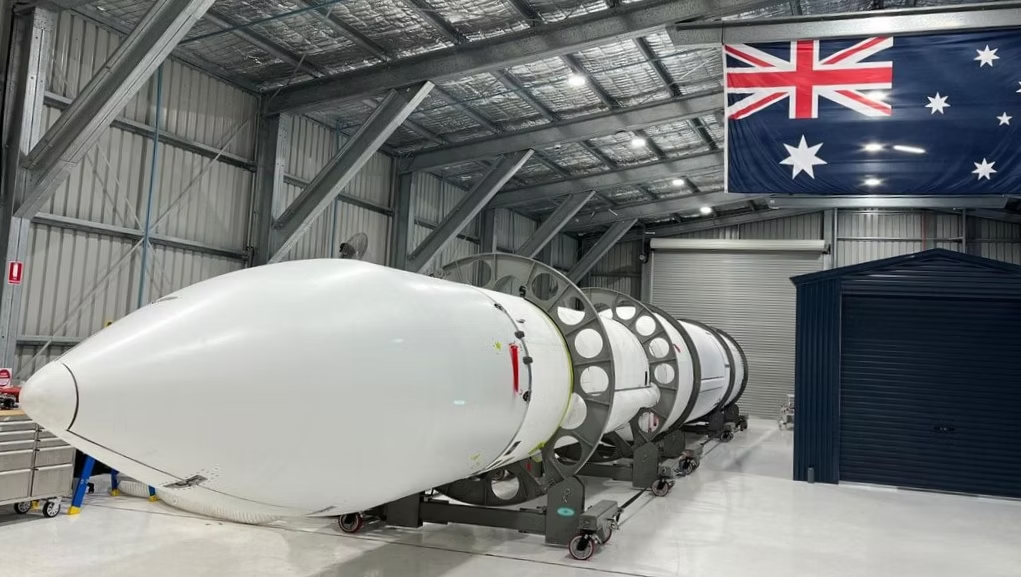Blue whales, and other reasons Australia’s space industry can’t launch
How over-regulation keeps rockets grounded
I recently joined a SpaceX livestream with my sons to watch a 100 meter rocket be thrust into orbit, separate into parts, and then get caught by giant mechanical chopsticks. Even after the ‘rapid unscheduled disassembly’ that followed, it was truly awesome to watch.
After the awe of the launch, family conversation quickly turned to if we could see a rocket launch like that in Australia. That sounded like a fun vacation to me, so I went searching for a commercial space industry closer to home.
What I discovered is that while we were satellite pioneers in the 1960s, today we are held back by ridiculous layers of over-regulation. Australian space companies have experienced years of frustrating delays, tens of millions of dollars of wasted capital, and rocket launch conditions that require grounding if a whale swims past.
Intuitively Australia seems like a great place to propel enormous metal tubes into orbit. We’ve got a lot of space, and not many people. The people we do have are talented and educated. We’re politically stable with good financial markets. We can enter many different orbits, making us attractive to less-lucky geographies. Australians also benefit markedly from the connectivity and services that the low earth orbit economy can give our regions (that’s according to an Australian government department).
Nevertheless, I still tune into US rocket launches, not Australian ones. While we have ambitious startups, we also have a regulatory state that wildly prioritises caution over accelerating towards the future - right when we need as much acceleration as possible.
Here are a few examples. And these are just the ones in the headlines at the moment (there are more).
South Australia is remote, with clear skies, and perfect trajectory paths over the Southern Ocean. It’s an incredible place to launch. But for Southern Launch it took 3 years to get approval for Australia’s first commercial orbital launch site in South Australia.
One approval problem was environmental rules. This is unsurprising given the Environmental Protection and Biodiversity and Conservation (EPBC) Act, which has hindered major Australian industries like mining and agriculture for years.
The long-awaited approval had many standard space-related requirements. Launch caps, height limits, notice periods.
Then it went from bureaucratic to bizarre.
The approval requires launches to be abandoned if there is a Southern Right Whale or Blue Whale within 1.5km. More specifically (from the approval):
j) ensure that at least one Marine Mammal Observer monitors for Southern Right Whale and Blue Whale in the marine waters within 1.5 km of the shoreline located south of the Action area from Flinders Crevasse to Cape Wiles for at least 30 minutes immediately prior to each proposed launch.
k) not launch if any Southern Right Whale or Blue Whale is present within 1.5 km of the shoreline located south of the Action area from Flinders Crevasse to Cape Wiles.
Turns out our frontier space industry is going to be in the business of hiring whale watchers (maybe one of my kids will get the gig - although I suspect they’ll be watching the rocket).
Unfortunately Southern Launch’s experience isn’t an isolated example.
In Queensland, Gilmour Space technologies have built impressive advanced rockets. Over the years they’ve raised over $140 million in venture capital and employed hundreds of people in Australia. But their rocket Eris is sitting idle in a hangar.

Their sophisticated rocket sat in hangers waiting for government approval. Those processes took over 2 years. These delays reportedly cost Gilmour Space a “$20 million hit to our capital”. Since recently receiving one of many required approvals, they are now waiting on the go-ahead from the aviation regulator CASA. Maybe we’ll see them takeoff in 2025.
As the CEO Adam Gilmour was recently quoted, they might have to go overseas:
My biggest concern right now is if we have to go through a similar process for our second launch, and for our third launch,” Mr Gilmour said. “That’s going to destroy the business.”
“I will move to the United States before that happens. But it’s just ridiculous how long it’s taken,” he said.
It should be deeply troubling to Australian policymakers that a local technology startup is thinking about going overseas because of our complex and time-consuming processes. Indeed, there have been some some positive and welcome moves focusing on reductions of space-specific approval processes.
But we must go even faster. Australia has a remarkable opportunity for a flourishing space industry. Investment into private space capabilities is flowing globally and neighboring countries like New Zealand are already capturing market share, we're running out of time. The capital and talent simply won’t hang around to launch.



